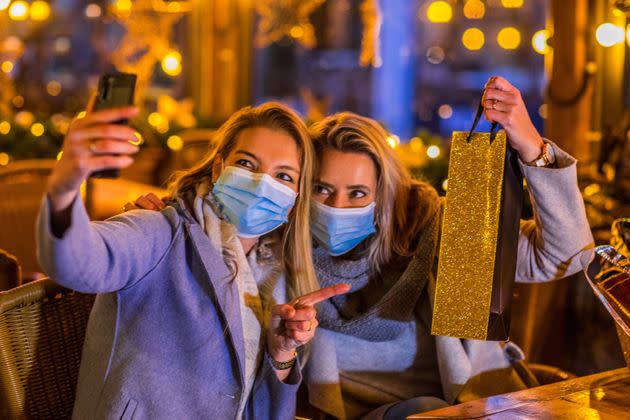How To Stay Safe Before Christmas If You Can't Get Your Booster Yet

Covid booster jabs will soon be available to everyone who is already double-vaccinated and aged 18 or over – but it won’t be logistically possible for the NHS to get everyone jabbed before Christmas.
The government has made it clear that older age groups and vulnerable people will have priority.
It also takes around two weeks for the additional dose to have any effect against Covid, and the extended rollout scheme is not yet to be operational.
Despite this, Downing Street has avoided telling the public to cancel or downscale their Christmas plans.
So what can you do to stay safe during the festive period when you might be mixing with more friends and family?
1. Wear your mask
Downing Street’s new Covid restrictions came in on Tuesday and made mask-wearing mandatory in shops and on public transport in England.
If you refuse to wear a mask in an area where it is legally required, you could be fined up to £200 unless you’re exempt.
While the government’s new rules mean you don’t have to cover your nose and mouth in all public areas, wearing a mask is known to be the single most effective measure for reducing your Covid risk so it is worth covering your face in any enclosed settings.
As the World Health Organisation (WHO) website explains: “Make wearing a mask a normal part of being around other people. The appropriate use, storage and cleaning or disposal of masks are essential to make them as effective as possible.”
2. Get tested before socialising
Health secretary Sajid Javid has urged people to take a lateral flow test before attending their Christmas parties this year, even if you don’t have any symptoms.
He said this should be part of the “sensible precautions that everyone can take” to ensure Christmas can still go ahead.
If you do have symptoms, it’s important to get a PCR test as soon as possible.

3. Think twice before socialising
The government has not recommended people cancel their social plans just yet.
Javid said: “I think that we can go ahead with whatever we planned for Christmas, I think that’s absolutely fine.”
But he added, “it’s just a sensible time for everyone” to “take whatever sort of cautious measures they can”.
The head of the UK Health Security Agency Dr Jenny Harries went further during an interview with BBC Radio 4 on Tuesday as she urged the public, “don’t socialise unless you need to”.
This caused a brief row with Downing Street who later overruled her claim.
Either way, the most Covid-safe way to socialise with smaller groups and to meet up with people outdoors, so that the virus’ particles are not trapped in an enclosed space.
4. Wash your hands frequently
The official advice to wash your hands for at least 20 seconds, and more often, has been in place since the beginning of the pandemic.
It’s particularly important to wash them before and after going on public transport. If this isn’t possible, use hand sanitiser.
5. Get vaccinated when called up by the NHS
The booster programme will soon be rolled out to everyone aged 18 and over.
While it is unclear how much impact the current vaccines will have against the Omicron variant, the jab is one of our best defences against Covid.
Vaccine developers working with Oxford University and BioNTech have said the existing jabs would still reduce the severity of Covid, but Moderna’s CEO Stephane Bancel said: “There is no world, I think where [the effectiveness of the current jabs] is the same level.”
However, the WHO maintains that all of these predictions are “premature”.
The Delta variant is also still the most dominant strain around the world and it is important to be protected against it especially as the the efficacy of the first and second vaccine doses does wane over time.
6. Follow the new travel rules
From November 30, double-vaccinated people entering the UK must take a PCR test by the end of the second day after their arrival. They must also self-isolate until they receive a negative test.
Unvaccinated people need to take a test 72 hours before returning to the UK and then take a PCR test on the second and eighth day of their return. They must self-isolate for a full 10 days too.
7. Try to work from home where possible
England is the only country in the UK which does not have official advice to work from home where possible.
Javid told the BBC that he did not think this measure is “necessary” and that the government has already set out new “appropriate, responsible things to do”.
Yet, the government’s advisory committee, SAGE, has told ministers that working from home is likely to have the greatest impact on reducing the virus’ transmission.
8. Get the flu jab
While getting the annual flu jab does not reduce your risk of catching Covid, it can stop you from catching the flu and the deadly virus at the same time.
Having both at once would seriously weaken your body’s immune response and make you more susceptible to suffering from severe Covid symptoms.
This article originally appeared on HuffPost UK and has been updated.

 Yahoo News
Yahoo News 




